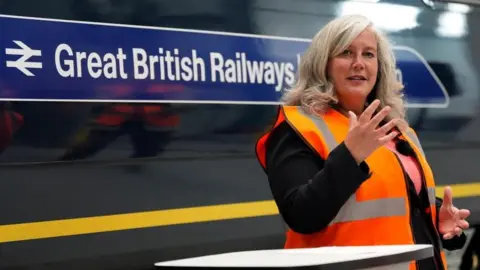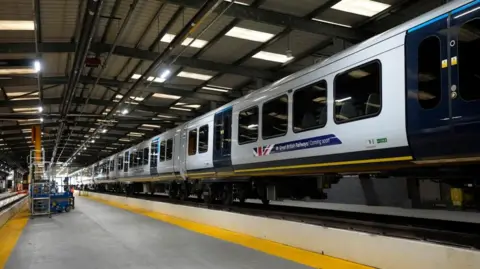South Western first rail firm renationalised by Labour
 PA
PASouth Western Railway (SWR) has been renationalised, making it the first train company to transfer to public ownership under Labour.
The first nationalised service, from Woking to Surbiton, departed on time at 05:36.
The government has hailed the move as a "new dawn for rail" but it held back from promising lower fares, focusing more on plans to improve services and use profits to reinvest in infrastructure.
Unions have expressed concerns over outsourcing to private companies, while the opposition Conservatives said Labour must "deliver on their promises".
SWR trains are now the responsibility of DfT (Department for Transport) Operator and will be integrated into Great British Railways (GBR), which will oversee all railway infrastructure.
GBR will not officially exist until MPs vote to create it, which looks set to be in the autumn.
On a visit to a train depot in Bournemouth, Transport Secretary Heidi Alexander described the nationalisation of SWR as a "real watershed moment".
Asked whether prices would go down for passengers, she told the BBC she could not promise lower fares, but assured passengers they would get "great value for money".
The first SWR service under public ownership was a rail replacement bus.
Passengers travelling on the 05.36 service from Woking to London Waterloo had to change to a bus at Surbiton because of engineering work
The service features the new GBR livery. The words "Great British Railways" and "coming soon" are painted in white against a royal blue background decorated with part of a union flag.
Back in 1996, the first privatised service was also operated by a rail replacement bus.
 PA Me
PA MeTwo more rail firms, C2C and Greater Anglia, will be brought into public ownership later this year.
Four major operators have already been brought under public ownership under previous Conservative governments - London North Eastern Railway (LNER), South Eastern, TransPennine Express, and Northern.
Seven more companies will be renationalised by 2027 as each of their contracts end – or sooner if their performance is judged to be unacceptable.
These are:
- West Midlands Trains
- East Midlands Railway
- Avanti West Coast
- CrossCountry
- Chiltern Railways
- Govia Thameslink Railway
- Great Western
Current government plans are to renationalise nearly all passenger rail services across England, Wales and Scotland by 2030, proposals which have been attacked by the Conservatives.
Shadow Transport Secretary Gareth Bacon said: "Labour have talked up the benefits of renationalisation for years and they will now have to deliver on their promises of lower ticket prices, an end to all disruption and strikes and better onboard services. The alternative is that, as usual, British taxpayers have to foot the bill for Labour."
The RMT union welcomed SWR's nationalisation but said it was concerned about outsourcing to private firms.
RMT general secretary Eddie Dempsey said: "Public ownership of South Western Railway is a major step forward and is a clear rejection of the failed privatisation model.
"But the job is incomplete when our contracted-out members remain outsourced and not reaping the benefits of nationalisation."
The government said it could not promise fares would be cheaper despite significant cost savings through renationalisation but any additional money would be invested in making services better.
Whitehall sources have told the BBC ministers hope to find ways to cut the cost of rail travel but it is impossible to make promises before GBR is formally established and services renationalised.
